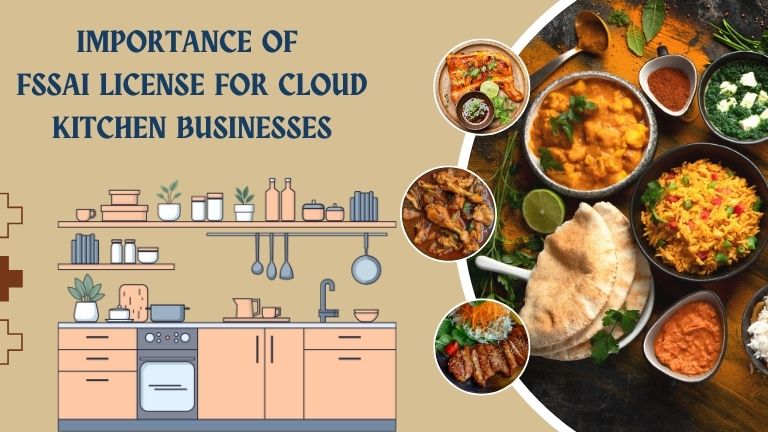The food industry has undergone a significant
transformation over the past few years. Among the most notable trends is the
emergence of cloud kitchens, also known as ghost kitchens or virtual kitchens.
These establishments operate without a physical dine-in space and primarily
cater to online food delivery services. However, while the business model is
innovative and cost-effective, ensuring food safety and compliance remains a
critical requirement. This is where the FSSAI license for cloud kitchen plays
a pivotal role.
What is an FSSAI License?
The Food
Safety and Standards Authority of India (FSSAI) is a government body
established under the Food Safety and Standards Act, 2006. Its primary
responsibility is to regulate and oversee the safety and quality of food
products in the country. Any entity involved in the food business, including
cloud kitchens, must obtain an FSSAI license to legally operate and ensure that
the food they prepare and serve is safe for consumption.
For cloud
kitchens, acquiring an FSSAI license is not just a legal obligation but also a
mark of credibility and trustworthiness in the eyes of customers and
stakeholders.
Why is an FSSAI License Important for Cloud
Kitchens?
Operating a
cloud kitchen involves preparing food that will be delivered directly to
customers. Since customers cannot visit a physical location to assess the
hygiene and quality of the kitchen, the FSSAI license for cloud kitchen acts
as a guarantee that the establishment adheres to the highest food safety
standards. Here are some key reasons why this license is crucial:
1. Legal Compliance
Without an FSSAI license, running a cloud kitchen is illegal. Non-compliance
can result in hefty fines, legal actions, or even the closure of the business.
2. Customer Trust
An FSSAI license reassures customers that the food being delivered to them has
been prepared under strict safety and hygiene protocols. This trust can
significantly boost a cloud kitchen's reputation and customer base.
3. Partnerships with Food
Aggregators
Leading food delivery platforms like Zomato, Swiggy, and Uber Eats require
partner restaurants, including cloud kitchens, to have an FSSAI license.
Without it, listing your kitchen on these platforms is impossible.
4. Improved Brand Image
Displaying the FSSAI logo on your packaging, website, or menu signals
professionalism and commitment to quality. It serves as a marketing tool to
attract and retain customers.
5. Avoiding Penalties
Operating without an FSSAI license can lead to severe
penalties, including fines and business closure. Staying compliant protects
your business from such risks.
Types of FSSAI Licenses for Cloud Kitchens
The type of
FSSAI license required for a cloud kitchen depends on the scale of its operations.
Here's a breakdown:
1. Basic Registration
Suitable for small cloud kitchens with an annual turnover of up to ?12 lakhs.
This is the simplest form of FSSAI license.
2. State License
If your cloud kitchen's annual turnover is between ?12 lakhs and ?20 crores,
you need to apply for an FSSAI State License.
3. Central License
For cloud kitchens with a turnover exceeding ?20 crores or those operating in
multiple states, a Central FSSAI License is mandatory.
Steps to Obtain an FSSAI License for Cloud Kitchen
Getting an
FSSAI license involves several steps, but the process is relatively
straightforward if you follow the guidelines. Here’s how you can apply:
1- Determine
the License Type
Based on
your cloud kitchen's turnover, decide whether you need a Basic Registration,
State License, or Central License.
2- Prepare
the Required Documents
Common
documents required for an FSSAI license include:
1. Passport-sized photographs
2. Proof of identity (e.g., Aadhaar
card, PAN card)
3. Proof of address of the kitchen
4. Business registration certificate
5. List of food items the kitchen
will prepare
6. Layout of the kitchen
7. NOC from local authorities (if
applicable)
3- Submit
the Application
Visit the
official FSSAI website and fill out the online application form. Upload the
required documents and pay the applicable fee.
4- Inspection by Authorities
Once the
application is submitted, an inspection of your kitchen premises will be
conducted to ensure compliance with food safety standards.
5- Issuance
of License
If your
application and inspection meet the necessary criteria, you will receive your
FSSAI license. This process usually takes 30–60 days.
Key Compliance Requirements for Cloud Kitchens
Obtaining an
FSSAI license is just the beginning. Cloud kitchens must adhere to ongoing
compliance requirements to retain their license:
1. Hygiene Standards
Ensure that your kitchen, equipment, and staff maintain high levels of
cleanliness and hygiene.
2. Food Quality Checks
Regularly test raw materials and finished products to ensure they meet quality
standards.
3. Proper Packaging
Use food-grade packaging materials to avoid contamination during delivery.
4. Staff Training
Train your staff on food safety protocols, including personal hygiene, food
handling, and storage practices.
5. Timely Renewals
Renew your FSSAI license before it expires to avoid legal complications.
Challenges and Solutions
While the
process of obtaining an FSSAI license for cloud kitchen is
fairly structured, entrepreneurs may face certain challenges:
1. Complex Documentation
The volume of paperwork can be overwhelming. Solution: Seek assistance from
professional consultants or legal experts.
2. Inspection Delays
Delays in inspections can slow down the licensing process. Solution: Ensure
your kitchen is fully compliant before applying to avoid rejections.
3. Lack of Awareness
Many new cloud kitchen owners are unaware of the exact requirements for an
FSSAI license. Solution: Conduct thorough research or hire a professional
service to guide you.
Conclusion
The FSSAI
license for cloud kitchen is more than just a legal formality; it is a
cornerstone of trust, safety, and credibility in the competitive food delivery
industry. By obtaining this license, you not only ensure compliance with the
law but also position your business as a reliable and quality-driven
establishment. Whether you are a budding entrepreneur or an experienced
restaurateur venturing into the cloud kitchen model, prioritizing food safety
and hygiene through an FSSAI license is a step you cannot afford to overlook.
ALSO
READ-

